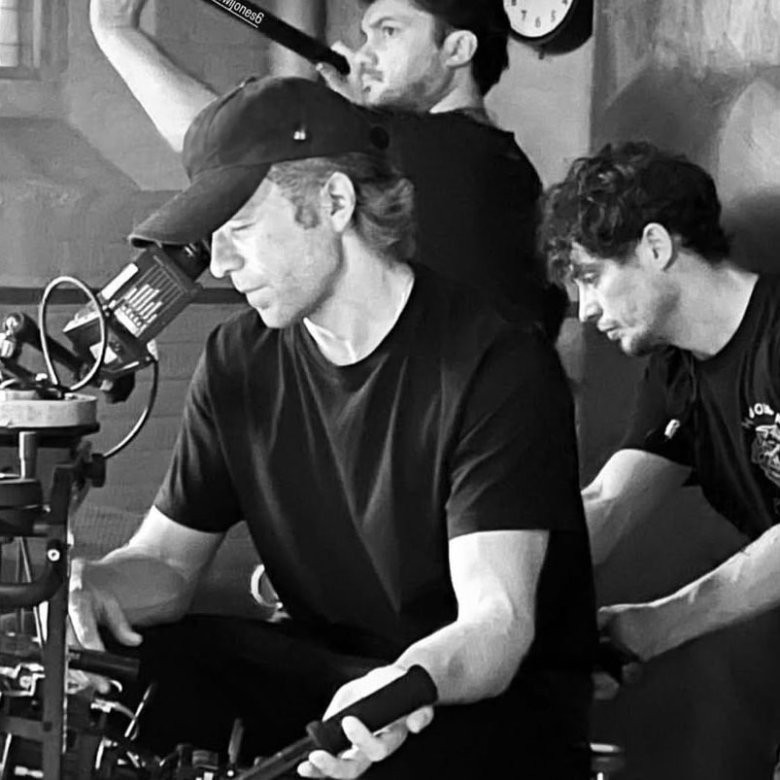Graduate cinematographer Bryan Gavigan on his BAFTA Cymru win
13 January 2025

Film graduate Bryan Gavigan scooped a BAFTA Cymru award for his work on the crime drama Passenger. Bryan was announced as the winner in the Photography & Lighting: Fiction category at a ceremony held at the International Convention Centre Wales (ICC Wales) at the end of 2024
Bryan graduated from Falmouth’s School of Film & Televsion in 2014 before going on to work as a gaffer on titles such as In My Skin and The Last Tree. He later transitioned to working exclusively as a Director of Photography (DOP), contributing to acclaimed productions including War of the Worlds and The Lazarus Project, before gaining further recognition as a cinematographer on Passenger.
We caught up with Bryan to learn more about life after graduating from Falmouth.
Congratulations on your BAFTA Cymru win! Can you tell us a bit about Passenger?
Thank you! Passenger is a detective crime drama with a distinct and somewhat playful supernatural element. The story follows our protagonist, Riya, a detective who moves to a small fictional town called Chadder Vale where she begins to investigate a series of seemingly unconnected mysteries.
It was a challenging yet rewarding show to work on. Combining the highly technical sci-fi elements of the show with its character-driven backbone was our greatest achievement from a photographic point of view.
Images above from the set of Passenger.
The most technical challenge was the night forest sequence that opens the show. We aimed to create a heightened and atmospheric lighting state that showcased the otherworldly nature of the monster occupying it. I took a non-traditional lighting approach, avoiding a single-point moon source and instead creating a softer, more dynamic three-dimensional lighting environment, allowing for silhouettes and bursts of colour. We lit the space entirely with LED lighting to prioritise sustainability, combining it with smoke and fake snow.
It was quite a challenge to get all these elements to work together during a wet and windy Manchester winter! Everything you see in the exteriors was achieved in-camera, with little to no VFX. We had to intercut these shots with the car and truck interior sequences, which were shot entirely in a blue screen studio.
What drew you into cinematography rather than other roles in film?
Initially, it was the only role I thought I fully understood. It made sense that someone had to be behind the camera making decisions about which lens to use, how to compose a shot, and how to light the frame, and I enjoyed the process of making those choices and appreciated noticing those decisions in other people’s work.
Cinematography, though, is so much more than the sum of those parts; the role is constantly evolving, and my interpretation and application of it change with every project.
How would you descibe your approach to cinematography?
I resonate most strongly with an intimate point of view, so my style probably reflects that. I like to feel and see the world through the perspective of the character, and my choices are often influenced by this approach.
How this translates to a specific style, I’m unsure, as it depends on the story. I’m sure there are hints of a style, but I like to think it’s constantly evolving. I try not to get too formulaic; the fear is that you end up boxing yourself in creatively.
You graduated in 2014. What are your fondest memories and most valuable learnings from the course?
I loved the exposure to European cinema, which at the time I would have struggled to discover on my own, as well as the fantastic lecturers and the way you could carve your own path through the course.
Arguably, though, the most valuable lessons came from the university experience as a whole. You can’t be a good cinematographer without feeling emotionally connected to your work, and the more life experience you have, the better you can relate to the material you’re visually representing.
All the technical knowledge will come—it’s not something to rush, as it’ll likely be different in five years anyway. Instead, it’s the human connections and experiences that inform your interpretation of a script that will stick with you and remain relevant forever. Those few years at university provide a concentrated dose of that.
What advice would you give to someone starting their career after finishing a Film degree?
Get on set as much as you can. Show a willingness to learn, even if the specific job isn’t what you want to do long-term. Be enthusiastic and kind—people will notice, and you’ll get more opportunities. Be confident, but not cocky. And always be on time!
Any upcoming projects that you're allowed to talk about?
I have two new shows coming out: A Cruel Love and Coldwater. Both are new series that you should be able to catch on ITV in the new year.
External links





